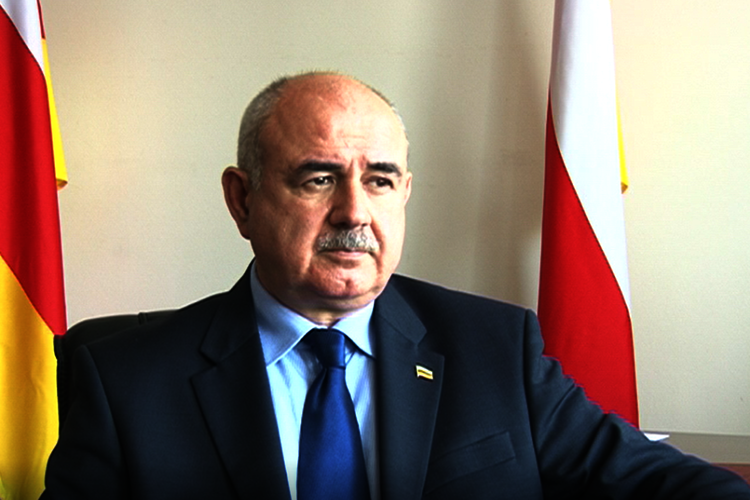— Mr. Medoev, did you expect your appointment as the Minister of Foreign Affairs or in other words, was there any agreement between you and the President during the presidential campaign?
— I had no agreements either with the President or with anyone from his team. I purposefully participated in the election campaign as a member of a presidential candidate’s team. Positions and career were the least of my concerns – one had to be result-orientated and thus we gained a fair and merited success. It was a natural decision for me, as there is no secret that yet in 2011 I supported this candidate and even today I believe that unless the famous events disrupt the electors’ choice, it would have been Anatoliy Bibilolov, who would have become the President. Neither before, nor later have I changed my political orientation. I have always considered upholding national interests as the main thing in my work.
— Are you going to change anything in the work of the Ministry?
— Firstly, I was welcomed by a good, coordinated team. Staff members of the Ministry are professionals, who love and know their work. There are no grounds we cannot discuss with my colleagues. Thus, there won’t be any changes regarding personnel, except perhaps intensifying and increasing the speed and scope of work.
— Your demission from the post of the Ambassador to the Russian Federation surprised even you. Tell us, please, why and how it happened.
— I have explicitly spoken on this subject earlier and would prefer not to go back to that period, but since this relates not only to me, I would mark, that it’s not used to behave this way in international relations. Not only because it looks badly to others. There are such concepts in politics as public way of thinking or responsibility of the authorities, including to partners, in this case it is the Russian Federation, which authorities have the right to be informed on important decisions, related to the bilateral relations. I even do not speak about the domestic protocol or official ethics… Such decisions should be unacceptable for any authorities.
— What do you think of the idea of entering of South Ossetia to Russia?
— I think it’s normal … This subject is not new; it has been raised by the best representatives of our intellectuals, since the beginning of the 20th century. It is a natural aspiration of the partitioned nation to rejoin within the country which is considered by the Ossetians as their state: firstly it was the Russian Empire, then the Soviet Union, and now the Russian Federation.
To put it in a nutshell, I completely agree with the position of President Bibilov on this issue, which fit current times: today, to bring this dream closer, we should, first of all, become an extremely self-sufficient country, keep on expanding international ties, strengthening our positions and promoting the image of our Republic and, alongside with this, work on improving living standards. We have to draw attention to ourselves as to the state with running economy, stable political system, economic potential and predictable internal and foreign policy.
— The number of states which have recognized South Ossetia haven't increased in the last few years, though such statements sounded more than once from the previous authorities. How, in your opinion, should work in this direction be conducted? Do you have any certain tactics, which you are going to use as the Foreign Minister to gain recognition from other states?
— We have been working on that issue and that is not a secret. The MFA has actively been implementing the line, developed by the President and the Government, including the one, aimed at search of partners at the international stage. Definitely, there is a strategy, and as for the tactical plan, consultations, meetings, earnest correspondence and etc. we conduct them as well.
— The Caucasus has always been among the most trouble regions in the world and it hasn’t become more predictable over time. What is your forecast on how the situation in Transcaucasia would develop? Could there be any drastic changes as, for example, return of Georgia to the orbit of Russian influence?
— I would emphasize that the Caucasus have always been a united geopolitical and ethnosocial organism, though the one with a peculiar difficult system of internal interaction, which to some extent remind the system of communicating vessels.
By all means any changes in any of its parts affect the neighboring regions and generally cause a certain resonance. The Caucasus “loves” balance and stability in internal affairs, as well as non-interference from outside, and the first thing directly depends on the second one.
Today we are witnesses of how non-regional powers disrupt this balance, how they fight for control over energy resources, transport corridors and financial flows, and with this background national interests of states in the Caucasus are obscured. The ruling elite is partially or completely dependent on transatlantic corporations and financial groups that in practice makes them time servers, which are not in condition to lead an independent policy.
In this situation, I believe, search of any “orbits” is an ungrateful business. Changing course or coming of the new elite to the forefront – it is in hands of the people of these states. However it is only the theory … Unfortunately, today, if to take, for example, the same Georgia, then it is hardly probable and poorly predictable because the national interests of this country are assigned to the here-and-now interests of “friends of Georgia”. They, in their turn, drag this country to the anti-Russian orbit, and make it a hostage of the general destructive line of the Western countries. And this is a violation of balance and a direct threat to national security of the whole Caucasus, South Ossetia included.
